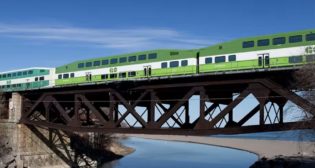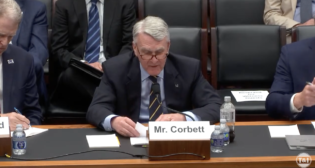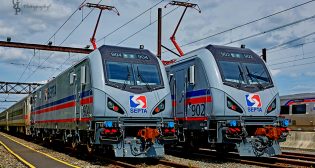
STB Issues Chicago Union Station Rent Decision
Written by Marybeth Luczak, Executive Editor
The Surface Transportation Board has resolved a long-running dispute between Amtrak and Metra, deciding that the Chicago commuter rail agency must pay $10.67 million annually for use of Amtrak’s Chicago Union Station.

The railroads’ agreement expired on June 29, 2019. When they were unable to reach a new arrangement, Amtrak on June 22, 2019 filed a petition under 49 U.S.C. § 24903(c), requesting that STB institute a proceeding and enter an order determining the compensation and terms for the Chicago commuter railroad’s use of the station. The STB issued an interim service order on July 26, 2019, allowing Metra to continue to access the station until STB issued a final decision.
In its Aug. 16 decision (download below), STB noted “its jurisdiction over this matter extends only to determining compensation for Metra’s use of CUS [Chicago Union Station]. The language of § 24903(c) is narrower than other statutes in which Congress has specifically given the Board the authority to set both compensation and other terms and conditions.”
Therefore, STB only addressed the disputed compensation categories of station operations and maintenance (SOM), policing, capital expenses and ground power, “as well as the applicable general and administrative (G&A) expenses addition amount and the inflation index that will apply to multiple cost categories.” According to the decision filing, Amtrak and Metra in May 2020 reached agreement on compensation for dispatching and maintenance-of-way costs.
The following chart shows the $10.67 million annual fee breakdown by category. It includes the costs sought by Amtrak and offered by Metra, plus the already agreed-to costs:

STB also found that Metra “will be responsible for its sole benefit capital projects.”
STB explained in its decision that Amtrak’s and Metra’s “remaining disputed contract terms, many of which the parties identified as issues but did not brief, would require the Board to make findings on issues that do not involve compensation determinations. For example, the parties ask the Board to resolve whether the agreement should include a provision governing termination for material default and whether Amtrak should have ultimate authority to set service schedules, among other issues.”
The other issues, according to the decision filing, include: modification of ingress, egress, and square footage used by Metra and its customers at the station; the standard under which Amtrak must provide janitorial and maintenance services; funding for extraordinary maintenance and capital improvements; whether Metra may assert control over emergency responses; whether Metra is entitled to any parking; and ADA compliance.
Given that Metra has “expressed a renewed interest and optimism in resolving those disputed contract terms through subsequent mediation … the Board strongly encourages the parties to consider mediation on any remaining disputed non-compensation contract terms,” according to the decision filing.

Amtrak on Aug. 18 provided the following statement to Railway Age: “Amtrak thanks the Surface Transportation Board for its decision resolving the protracted negotiations regarding fair compensation for Metra’s use of leased space at Amtrak-owned Chicago Union Station. We can proceed to complete and sign a lease that is in the best public interest and can continue our work together to safely grow both of our services to the benefit of everyone.”
Metra Spokesman Michael Gillis told Railway Age on Aug. 18: “As you can tell by the Surface Transportation Board’s 31-page decision, the dispute between Metra and Amtrak over rent at Chicago Union Station is no simple matter. It involves complex interpretations of laws, differing opinions about how, when and where to calculate and allocate expenses, and other disputes over which reasonable parties can and do disagree. Metra is grateful for the Board’s thoughtful decision, and we look forward to working with Amtrak to resolve our remaining differences. Both parties are simply trying to reach the best resolution for our customers and stakeholders.”
Further Reading from Railway Age Capitol Hill Contributing Editor Frank N. Wilner:
• “Amtrak as Bully”
• “Amtrak Bullying Now Targets SEPTA”



